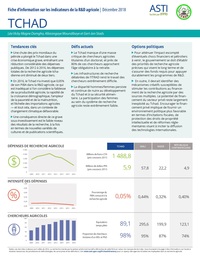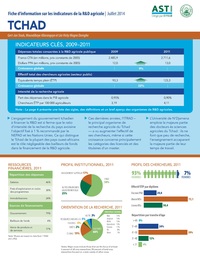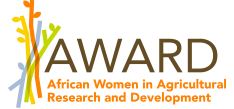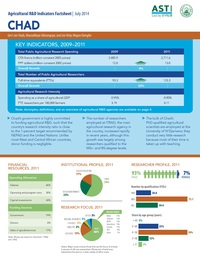Authors:
Léa Vicky Magne Domgho, Allarangaye Moundibaye and Gert-Jan Stads
Year:
2018
Publisher
International Food Policy Research Institute and Institut Tchadien de Recherche Agronomique pour le Développement.
Back to:
Key trends
Tchad : ASTI–ITRAD Fiche d’information 2018
Tendances clés
Une chute des prix mondiaux du pétrole a plongé le Tchad dans une crise économique grave, entraînant une réduction considérable des dépenses publiques. De 2012 à 2016, les dépenses totales de la recherche agricole tchadienne ont diminué de deux tiers.

Tchad : ASTI–ITRAD Fiche d’information 2017
Volatilité du financement
Les recettes pétrolières du Tchad sont déterminantes pour la hauteur de la subvention d’État que touchent les organismes publics, dont ceux de la recherche agricole. Entre 2012 et 2014, une forte baisse de ces revenus entraîna une baisse d’environ 25% des dépenses de la recherche agricole. Les organismes de recherche se doivent de diversifier encore plus leur base de financement, notamment en générant des revenus propres par la vente de biens et de services.
Sous-investissement grave
Authors:
Gert-Jan Stads, Allarangaye Moundibaye, and Léa Vicky Magne Domgho
Year:
2017
Publisher
International Food Policy Research Institute and Chadian Institute of Agricultural Research for Development
Back to:
Funding fluctuations
Government funding to public institutes, including agricultural research agencies, is heavily dependent on the country’s oil revenues, which fell sharply between 2012 and 2014. During that time, Chad’s agricultural research expenditures contracted by about 25 percent. In order to mitigate future funding shocks, it is important that research agencies continue to diversify their funding base, in particular by generating income internally through the sale of goods and services.
Serious underinvestment
Tchad: ASTI–ITRAD Fiche d’information 2014
L’engagement du gouvernement tchadien à financer la R&D est si ferme que le ratio d’intensité de la recherche du pays avoisine l’objectif fixé à 1 % recommandé par le NEPAD et les Nations Unies. Ce qui distingue le Tchad de la plupart des pays ouest-africains est le rôle négligeable des bailleurs de fonds dans le financement de la R&D agricole.

Authors:
Gert-Jan Stads, Moundibaye Allarangaye, and Léa Vicky Magne Domgho
Year:
2014
Publisher
International Food Policy Research Institute and Chadian Institute of Agricultural Research for Development.
Back to:
Chad’s government is highly committed to funding agricultural R&D, such that the country’s research intensity ratio is close to the 1-percent target recommended by NEPAD and the United Nations. Unlike most West and Central African countries, donor funding is negligible.
The number of researchers employed at ITRAD, the main agricultural research agency in the country, increased rapidly in recent years, although this growth was largely among researchers qualified to the MSc- and BS-degree levels.


